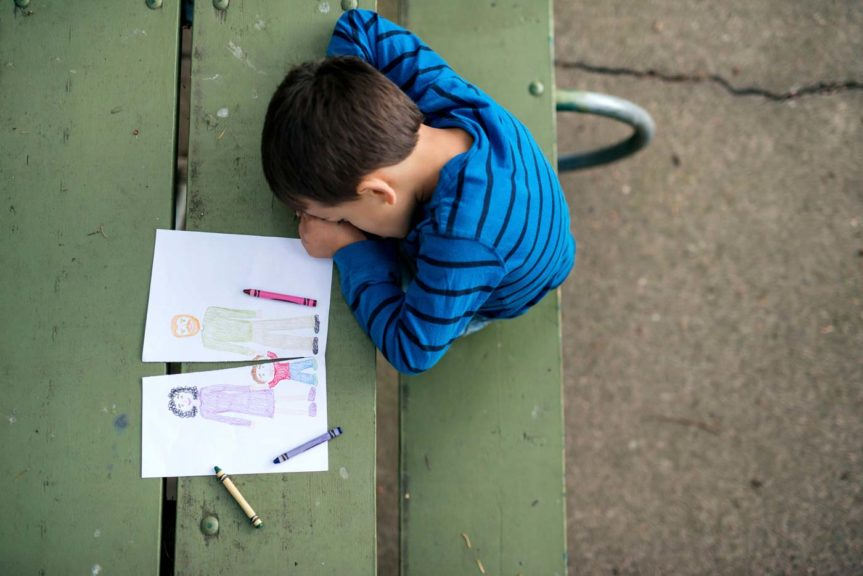It seems like there are more “hot button” topics these days than ever before. And many of these issues concern things that kids these days are experiencing.
There is one particular situation that has become so commonplace that it isn’t even talked about a whole lot anymore, yet according to Pew Research Center, over half of the entire population of kids have experienced it.
Divorce.
It’s not a problem that just affects adults. Kids who have gone through the divorce of their parents have experienced their entire world being turned upside down.

They will live with the ramifications of divorce for the rest of their lives.
When a divorce happens—whatever the circumstances—kids experience psychological, behavioral, and spiritual effects.
Divorce is not a new trend in families, but it is one that has far reaching effects and implications.
A large percentage of the kids in our churches have experienced divorce in their families, but churches and the kids’ ministry world rarely talk about it.
When a divorce happens—whatever the circumstances—kids experience psychological, behavioral, and spiritual effects.
And we need to be prepared to minister to the kids in our churches and our communities who have been impacted by divorce.
Psychological Effects
Imagine if you woke up tomorrow and every earthly thing that had been status quo in your life changed overnight. This is the nightmare that kids whose families are going through divorce experience.
Can you imagine the effects this shuffling has on kids’ hearts and minds?
Their security is shaken. The family unit that has been their foundation has been ripped apart. Living arrangements will change. They may have to switch schools.
Their routines will be altered. Their financial situations may be radically different. A life-long pet may not live with them anymore. The normal that was so comfortable is now gone—forever.
Absence vs Shuffling
Kids may find themselves in one of two very different situations. Sometimes after a divorce, one parent becomes absent—either the parent disappears completely or spends very little time with them.
Kids now have a gaping hole where a parent’s presence used to be.
If both parents remain in the child’s life, the child may begin splitting time between two homes.

Kids may feel like they are living two different lives. There may be one set of rules, expectations, and lifestyle choices at mom’s house and a completely different set at dad’s house.
Kids in shared custody situations constantly shift back and forth between these two lives.
Can you imagine the effects this shuffling has on kids’ hearts and minds?
Guilt
Every child of divorce will wonder at some point, “Was this my fault?” They are seeking concrete, kid-sized answers to a very complex, adult-sized situation.
Kids think back to how often they got in trouble or to a mistake they recently made. They wonder if they hadn’t done those things, would their parents still be together?
Kids will carry a lot of guilt that they absolutely should not carry.
In addition to the guilt they feel, they will continually wish that life could go back to how it used to be. For many years they will idealize the past.
Without help, their thinking will become stuck in the “what if’s”.
Behavioral Effects
With the psychological effect of divorce on kids being so massive, it’s not at all surprising that kids also experience behavioral changes. Kids may withdraw or they may act out.
Either extreme is communicating the same thing. Their world has been rocked.
In the book What About the Kids?: Raising Your Children Before, During, and After Divorce, Sandra Blakeslee says,“Children don’t sit down, look you in the eye, and tell you that they’re worried or unhappy. They show their unhappiness by making sudden changes in their behavior.”
Kids may regress in their developmental behavior. Kids who were potty-trained may start wetting their pants or their beds. Elementary children may start speaking with baby-ish talk.
On top of that, the parents are working through their own trauma, adjustments, and emotions. They are overwhelmed. They may not have the capacity to think past their own immediate experience.

As a result, even good, devoted parents may be emotionally distant and leave kids to process these enormous changes virtually on their own.
Kids in these circumstances may feel unseen and out of control of their worlds.
These feelings may manifest in attention-seeking behaviors or choices, such as being loud, disruptive, or seeking dangerous situations.
Or they may choose to become defiant or completely withdraw into electronics and solitude.
Spiritual Effects
In the midst of so much turmoil, spiritual needs may land low on the priority list for an overwhelmed single parent. In fact, kids may even see one of their parents walk away from faith altogether.
This is a confusing time for kids, but it is a powerful opportunity for the church to come alongside families because this is a critical crossroads in the spiritual life of these kids.
Kids may pray with great diligence for God to intervene in their parents’ marriage. They may bargain and plead.
When the divorce inevitably happens, they may question why God didn’t intervene in their parents’ marriage. They might also assume that God didn’t hear their prayers at all.
Come alongside families because this is a critical crossroads in the spiritual lives of these kids.
Kids may be afraid to express to anyone how angry they are with God or how they wonder if He is truly real.
Before, During & After Divorce
When we recognize the intense implications of divorce on every part of a kid’s life, we have to recognize that there is much opportunity for ministry.
How can your church minister to families before, during, and after the divorce?

Before the Divorce
The unfortunate reality is families don’t usually ask for help from the church until their marriage is just about over or divorce has been filed.
Often by then there is too much hurt for us to help. Sometimes the kids may be the first to tell us what is happening.
When we are made aware of what is going on, it is important for your pastoral staff to reach out to both parents involved.
Remember—tensions will be high, and feelings will be extreme.
So, it’s important to avoid the appearance of choosing sides and recognize that all parties—even if it looks like only one spouse is at fault—need biblical encouragement and support.
Reach out to both parties and offer counseling, resources, or just a safe place to talk. Don’t assume you know the whole story.
If appropriate, non-judgmental counsel to encourage reconciliation is best, but recognize that some people at this stage have already made up their minds about their course of action.
Be prepared with contacts for trusted, professional Christian counselors in your area.
During the Divorce
Despite what the commercials say, divorces are not quick and easy.
Recognize that this is a major life trauma in the life of every member of the family. Every family member will be stressed and likely surviving day-by-day. It is a long, painful process.
Be a consistent presence in the lives of the kids in your ministry. Even if they don’t want to talk, you will be providing a small level of stability—that they may be lacking—if they know you are there for them each week.
All you need to do is greet them with a smile—maybe a hug—and the love of Jesus.
And keep in mind that even when kids seem to be doing “just fine”, they may just be good actors. Suggest counseling for the kids and even offer for the church to help with the cost if possible.
If parents feel guilt or shame, they may avoid church altogether. If the family begins missing church, reach out to let them know they are missed.
But be sensitive to avoid any undertones that would make them feel embarrassed or judged. Encouraging and supportive notes or texts can be extremely meaningful in this difficult time.
After the Divorce
Divorce is not something kids “get over”. They may grow accustomed to their new normal, but at every transition and every age stage in their lives, they will re-experience some level of the trauma of divorce.
Understand that there is a need for long-term ministry and care.
As single parents settle into their new roles, keep your eyes open for practical needs the church can meet.
Mowing grass, providing groceries, or helping with childcare may be simple ways your church can support the family.

Connect the newly single parent with others—community is important. Recognize that everything shifts for this parent, including friendships and relationships within small groups.
More often than not, one parent is rallied around and the other is isolated. And even the parent who has a lot of support in the beginning eventually feels like they don’t fit anymore.
Make sure your church is a place that helps people heal following divorce, not feel shunned or less than in any way.
Divorce is not something kids “get over”.
Finally, recognize that remarriage and the creation of a blended family typically makes things harder—not easier.
In his book, The Smart Stepfamily: 7 Steps to a Healthy Family, Ron Deal says that it can take as long as five years for a blended family to find a rhythm, navigate the challenges, and genuinely feel connected as a family.
Blending families involves the very great challenges of blending kids, lifestyles, discipline philosophies, routines, and so much more.
Too often our perception is that remarriage is the redemption for the single parent, and all will be better after that second wedding. But keep in mind that kids in blended families will also need continued care.
Logistical Ministry Considerations
As you keep in mind the number of kids in your ministry who have experienced divorce, there are some practical things you can do in your ministry.
Seek to be a place of understanding, security, and safety when kids’ lives are in turmoil.
Be cautious of making a big deal about “perfect attendance”. Some kids have no choice about being there every week.
If they are spending every other weekend with a different parent, there is no way they can have perfect attendance. Your chart with stickers for attendance will be a weekly reminder to them of their situation.
Evon Flesberg speaks for these kids in The Switching Hour: Kids of Divorce Say Goodbye Again by saying, “It helps me when you remember that I am away not because of my own choice. Please help me think of ways to feel connected.”
Instead of highlighting perfect attendance, could you instead create a system to keep kids in the loop when they have to miss church?
Legal implications are another unfortunate reality of divorce. Make sure that you have a clear understanding of custody arrangements.
If the situation is volatile, make sure that you have a copy of any legal order that restricts access to the child.
Practically, the best thing your ministry can do is make sure every volunteer strictly follows your checkout procedures.
Divorce is a tragic experience for families, but God can redeem the situation for His glory and the good of all involved.
Your church can be the hands and feet of Jesus by coming alongside solo parents with support and encouragement.
My prayer is that children’s ministries will become aware of the hurt that is behind kids’ behavior and seek to be a place of understanding, security, and safety when kids’ lives are in turmoil.

66 Short Bible Verses Perfect for Kids to Memorize

66 Short Bible Verses Perfect for Kids to Memorize








